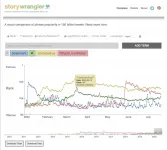(Press-News.org) Highlights
The results of a new study support the validity of a score that considers various patient-reported outcome measures and preferences for assessing health-related quality of life in individuals with kidney failure.
The score is calculated from assessments of cognitive function, depression, fatigue, pain interference, physical functioning, sleep disturbance, and ability to participate in social roles.
Washington, DC (July 16, 2021) -- Results from a new study support the validity of a score that considers various patient-reported measures and preferences for assessing health-related quality of life and promoting patient-centered care in individuals with kidney failure. The study appears in an upcoming issue of CJASN.
The score, called the Patient Reported Outcomes Measurement Information System (PROMIS®)-Preference (PROPr) Summary Score, is determined from 7 domains: cognitive function, depression, fatigue, pain interference, physical functioning, sleep disturbance, and ability to participate in social roles.
When investigators led by Istvan Mucsi, MD, PhD and Jing Zhang BSc, MPH (University Health Network and University of Toronto) correlated PROPr with other health-related measures, their findings supported the validity of PROPr among 524 patients who were undergoing hemodialysis or who had recently received kidney transplants.
"Up to 70% of patients with kidney failure experience persistent physical symptoms and emotional distress that substantially impair health-related quality of life. These concerns are under-reported, under-recognized and under-managed," said Dr. Mucsi. "Our results open the doors for the use of PROPr and PROMIS® tools in nephrology research and in the care of patients with kidney failure."
INFORMATION:
Study co-authors include Ron D. Hays, PhD, Janel Hanmer, MD, PhD, Barry Dewit, PhD, John Devin Peipert, PhD, Evan Tang, BSc, Daniel Breitner, BSc, Mohammed Saqib, BSc, Dan Li, BSc, Rabail Siddiqui, BSc, Nathaniel Edwards, MS.
Disclosures: The authors reported no relevant financial disclosures.
The article, titled "Evaluation of PROMIS Preference Scoring System (PROPr) in Patients Undergoing Hemodialysis or Kidney Transplant," will appear online at http://cjasn.asnjournals.org/ on July 16, 2021, doi: 10.2215/CJN.01880221.
The content of this article does not reflect the views or opinions of The American Society of Nephrology (ASN). Responsibility for the information and views expressed therein lies entirely with the author(s). ASN does not offer medical advice. All content in ASN publications is for informational purposes only, and is not intended to cover all possible uses, directions, precautions, drug interactions, or adverse effects. This content should not be used during a medical emergency or for the diagnosis or treatment of any medical condition. Please consult your doctor or other qualified health care provider if you have any questions about a medical condition, or before taking any drug, changing your diet or commencing or discontinuing any course of treatment. Do not ignore or delay obtaining professional medical advice because of information accessed through ASN. Call 911 or your doctor for all medical emergencies.
Since 1966, ASN has been leading the fight to prevent, treat, and cure kidney diseases throughout the world by educating health professionals and scientists, advancing research and innovation, communicating new knowledge, and advocating for the highest quality care for patients. ASN has more than 21,000 members representing 131 countries. For more information, visit http://www.asn-online.org.
Highlights
The sodium-glucose co-transporter 2 inhibitor dapagliflozin reduced kidney, cardiovascular, and mortality risks in patients with advanced chronic kidney disease, similar to benefits seen in individuals with normal or moderately impaired kidney function.
Rates of serious side effects were similar in patients with advanced chronic kidney disease who received dapagliflozin or placebo.
Washington, DC (July 16, 2021) -- Studies have shown that diabetes drugs called sodium-glucose co-transporter 2 (SGLT2) inhibitors can provide kidney- and cardiovascular-related ...
Researchers at University of California San Diego School of Medicine and Rady Children's Institute for Genomic Medicine have produced a stem cell model that demonstrates a potential route of entry of SARS-CoV-2, the virus that causes COVID-19, into the human brain.
The findings are published in the July 9, 2021 online issue of Nature Medicine.
"Clinical and epidemiological observations suggest that the brain can become involved in SARS-CoV-2 infection," said senior author Joseph Gleeson, MD, Rady Professor of Neuroscience at UC San Diego School of Medicine and ...
PITTSBURGH, July 16, 2021 - For the first time ever, researchers from the University of Pittsburgh School of Medicine discovered that phages--tiny viruses that attack bacteria--are key to initiating rapid bacterial evolution leading to the emergence of treatment-resistant "superbugs." The findings were published today in Science Advances.
The researchers showed that, contrary to a dominant theory in the field of evolutionary microbiology, the process of adaptation and diversification in bacterial colonies doesn't start from a homogenous clonal population. They were shocked to discover that the cause of much of the early adaptation wasn't random ...
Researchers at UC San Francisco are zeroing in on how the immune system may play a role in miscarriage, which affects about a quarter of pregnancies.
Working in mice, the researchers have found that a recently discovered subset of cells in the immune system may prevent the mother's immune system from attacking the placenta and fetus. If the research is confirmed in further animal studies, and the cells play a similar role in people, they could point the way toward new therapies for pregnancies that are threatened by defects in immune tolerance.
The researchers showed that pregnant mice who did not have this subset of cells, known as extrathymic Aire-expressing cells, were twice as likely to miscarry, and in many ...
UNIVERSITY PARK, Pa. -- From biochemical reactions that produce cancers, to the latest memes virally spreading across social media, simple actions can generate complex behaviors. For researchers trying to understand these emergent behaviors, however, the complexity can tax current computational methods.
Now, a team of researchers has developed a new algorithm that can serve as a more effective way to analyze models of biological systems, which in turn allows a new path to understanding the decision-making circuits that make up these systems. The researchers add that the algorithm will help scientists study how relatively ...
For thousands of years, people looked into the night sky with their naked eyes -- and told stories about the few visible stars. Then we invented telescopes. In 1840, the philosopher Thomas Carlyle claimed that "the history of the world is but the biography of great men." Then we started posting on Twitter.
Now scientists have invented an instrument to peer deeply into the billions and billions of posts made on Twitter since 2008 -- and have begun to uncover the vast galaxy of stories that they contain.
"We call it the Storywrangler," says Thayer Alshaabi, a doctoral student at the University of Vermont who co-led the new research. "It's like a telescope to look -- in real time -- at all this data that people ...
A new method developed by Institute for Systems Biology (ISB) and University of California, Riverside provides new insights into cancer biology by allowing researchers to show how fatty acids are absorbed by single cells.
Fatty acids, along with glucose and amino acids, are a major energy source for cellular growth and proliferation, and abnormal fatty acid metabolism is often seen in cancer. Dr. Wei Wei's lab at ISB and Dr. Min Xue's lab at UC Riverside have been collaborating for years to develop a series of chemical probes and analytical approaches for quantifying cellular glucose uptake, lactate production, amino acid ...
Climate change is driving a large increase in intense, slow-moving storms, a new study by Newcastle University and the Met Office has found.
Investigating how climate affects intense rainstorms across Europe, climate experts have shown there will be a significant future increase in the occurrence of slow-moving intense rainstorms. The scientists estimate that these slow-moving storms may be 14 times more frequent across land by the end of the century. It is these slow-moving storms that have the potential for very high precipitation accumulations, ...
New research published in Nature Medicine reveals willingness to get a COVID-19 vaccine was considerably higher in developing countries (80% of respondents) than in the United States (65%) and Russia (30%).
The study provides one of the first insights into vaccine acceptance and hesitancy in a broad selection of low- and-middle income countries (LMIC), covering over 20,000 survey respondents and bringing together researchers from over 30 institutions including the International Growth Centre (IGC), Innovations for Poverty Action (IPA), WZB Berlin Social Science Center, the Yale Institute for Global Health, the Yale Research Initiative on Innovation and Scale (Y-RISE), ...
Engineers at UC Riverside have unveiled an air-powered computer memory that can be used to control soft robots. The innovation overcomes one of the biggest obstacles to advancing soft robotics: the fundamental mismatch between pneumatics and electronics. The work is published in the open-access journal, PLOS One.
Pneumatic soft robots use pressurized air to move soft, rubbery limbs and grippers and are superior to traditional rigid robots for performing delicate tasks. They are also safer for humans to be around. Baymax, the healthcare companion robot in the 2014 animated Disney film, Big Hero 6, is a pneumatic robot for good reason.
But existing systems for controlling pneumatic soft robots still use electronic valves ...



